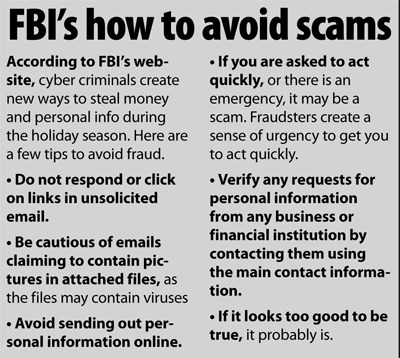When Herb Cunniff picked up the phone, he was surprised to hear the tearful voice of his granddaughter explaining that she had been in a traffic accident in Mexico and police were holding her for driving under the influence of alcohol.
Then she supposedly transferred the call to the American Embassy in Mexico City — where an employee said if he wanted his granddaughter to get out of the country he would need to wire $23,083.
Cunniff began to suspect something was not right when the embassy asked for cash not a credit card.
It was also out of character for his granddaughter — a straight A honor student — to get in trouble, and she had just been on vacation in Las Vegas, so how did she end up in Mexico?
But it was uncanny, even eerie how the voice sounded just like his granddaughter.
So when he got off the phone he immediately called the American Embassy in Mexico City, then the FBI and the police. They all told him the same thing — it was a scam.
This is not a new scheme, just one of many popping up across the country often requesting cash sent via Western Union.
Undersheriff John Zerby said beware of anything involving a wire transfer.
“Money sent by Western Union is untraceable because it’s cash,” said Zerby. “So once it’s gone — it’s gone.”
He’s not sure how the lists of targeted people are generated, but the elderly are often singled out.
“They [the elderly] are often kinder,” said Zerby. “And if the scam involves a grandchild, those emotions can override logic.”
And law enforcement isn’t immune from attempted scams.
Zerby recently received a fraudulent email asking for a money transfer for a “friend” in need of assistance in Europe. Another common scam involves a person claiming to be from an undeveloped country who has recently inherited a large sum of money, and all they need is a bank account to deposit the newfound fortune.
“Once they have the bank account number they clean it out,” said Zerby.
These are just a few examples of the five or six letters the sheriff’s office receives a day reporting fraud. Some letters — involving scams over $100,000 — are sent to the Secret Service, but reports are so rampant that not all are investigated.
On San Juan, there has been a recent spike in the amount of fraud reported, Zerby said. He advises islanders to follow Cunniff’s example and if you suspect something is just not right — verify who you are really talking to or emailing.
Cunniff he doesn’t think of himself as clever, he just has a lot of practice solving problems, which helped him avoid a scam.
“Like they say all’s well that ends well,” said Cunniff.
If you do get involved in a scam, take any receipts or documentation, and file a report to the sheriff’s office.
You can also call the Washington Attorney General’s office at 360-753-6200 or visit the FBI’s www.ic3.gov/complaint/default.aspx to report a scam.



